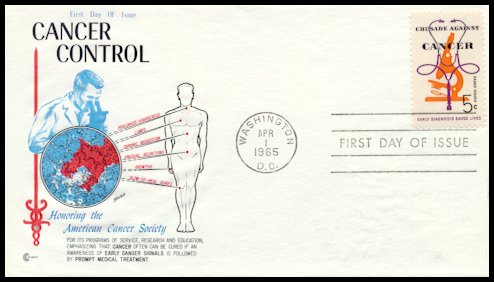.
Cancer
During the process of cell division --
the basis of normal body growth and repair -- cells become differentiated
into the specific kinds needed for each organ or body function. Each
kind of cell divides into its own kind, equipped to do the job it was designed
to do. Under certain conditions not yet completely understood, some
cells do not differentiate in this way. They multiply in irregular
and disorderly fashion and compete with normal cells for nutrition and
space. These cell masses are called tumors. Benign tumors that
remain localized may not be troublesome unless they mechanically interfere
with some body function. Malignant tumors that grow rapidly and spread
or destroy tissue are collectively called cancer. This unrestrained
growth of abnormal or undifferentiated cells will infiltrate vital organs
and destroy the individual if not checked. Since most cancers cannot
be prevented, it becomes necessary to detect them early while prompt treatment
can still control them. A thorough physical examination every year
is essential. Equally helpful is to know and heed the American Cancer
Society's Seven Danger Signals:
1) Unusual bleeding or discharge.
2) A lump or thickening in the breast
or elsewhere.
3) A sore throat that does not heal.
4) Change in bowel or bladder habits.
5) Hoarseness or cough.
6) Indigestion or difficulty in swallowing.
7) Change in wart or mole.
If any one of these symptoms persists for
longer than two weeks, see your doctor immediately.
.



